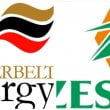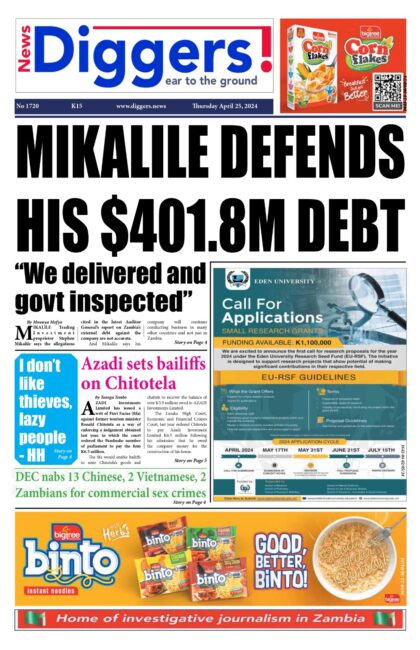THE Copperbelt Energy Corporation Plc (CEC) says government’s move to declare its distribution and transmission assets as common carriers amounts to expropriation as the company is on the brink of defaulting on all its loans borrowed from international lenders.
In a statement, Tuesday, company corporate communication senior manager Chama Nsabika lamented that with Energy Minister Mathew Nkhuwa’s issuance of Statutory Instrument (SI) No. 57 of 2020, CEC was at the brink of defaulting on all its loans.
“CEC notes the following significant events leading to the issuance by the GRZ of SI 57: 1) 8 May, 2020 – CEC institutes measures to recover debt from KCM, which has now grown to about US $144 million 2) 13 May, 2020 – KCM admits its indebtedness to CEC 3) 26 May, 2020 – Zesco requests use of the CEC transmission network to supply power to its new unknown client on the Copperbelt and requests for a meeting in the first week of June 2020 4) 28 May, 2020 – CEC acknowledges the Zesco request, stating that it stands ready to start negotiations as long as the customer involved has no valid agreement with CEC and does not owe CEC money 5) 28 May, 2020 – the Minister of Energy writes to CEC asking the Company to give path to Zesco to supply power to KCM 6) 29 May, 2020 – GRZ through the Minister of Energy promulgates SI 57 declaring CEC infrastructure Common Carrier 7) 31 May, 2020 – ERB writes CEC setting a wheeling tariff equivalent to about 30 per cent of CEC’s current network tariff (current tariff charged for using the CEC network),” Nsabika stated.
“CEC has become aware of SI 57 issued by the Minister of Energy, Honourable Mathew Nkhuwa, declaring all of CEC’s distribution and transmission lines as Common Carrier. From the above events, it is abundantly clear that the GRZ has for all intents and purposes taken steps that amount to expropriation of the CEC infrastructure and CEC is now on the brink of defaulting on all its loans borrowed from international lenders. GRZ’s actions have the full effect of taking away CEC’s commercial and property rights, and completely inhibiting the company from taking viable business decisions, including enforcing its legal and commercial rights in the best interest of the business.”
She added that the declaration came just hours before the expiry of CEC’s Power Supply Agreement (PSA) with Konkola Copper Mines (KCM) Plc and the failed negotiations for the renewal of the Bulk Supply Agreement (BSA) with Zesco, both government-controlled institutions.
“This declaration came just hours before the expiry of CEC’s PSA with KCM, which took effect at midnight on 31 May, 2020, and in the wider context of the failed negotiations for the renewal of the BSA between CEC and Zesco, which lapsed on 31 March, 2020. Both KCM and Zesco are, as of now, effectively controlled by the Government of the Republic of Zambia (GRZ),” she stated.
But Nsabika announced that CEC was currently engaging government in dialogue with the hope of restoring the company’s commercial and property rights.
“CEC takes this opportunity to advise all its investors of these actions from the GRZ that are highly detrimental to the well-being of the business and its ability to continue as a going concern. Investors are notified that CEC will, in the time being, engage in dialogue with the GRZ in the hope of obtaining an amicable and equitable outcome targeted at restoring the company’s commercial and property rights. CEC will keep all its investors fully updated,” stated Nsabika.













2 Responses
Does CEC board of directors consists of any enemy to the current government? If the answer is yes, then it explains government’s actions. This appears to be same style of action as in the case of Prime TV closure.
Does this PF Govt know what they doing, or are they just simply greedy and incompetent ? They were well aware of the expiry of the agreements, why didnt they amicably resolve issues well ahead of time. KCM run by PF is a disaster. They have NO CAPACITY to run the mine and NO funds to continue. KCM owes CEC money. Why don’t they pay? Same thing happened with Zesco run by PF with Maamba Collieries. PF needs to bring in competent people on merit basis to run parastatals accordingly as they have shown numerous times that they dont have any reputable and qualified people. They’re just political appointees who are drawing the companies dry. What a disaster. Didnt they learn anything from Kaunda’s mistakes who ran parastatals like they belonged to UNIP breeding disaster and corruption. Help the Zambians by doing the right thing, RESIGN. Leave something for the future generations. God bless Zambia. Regards,
A Zambian CEC shareholder through LUSE. Bought shares years ago in a good well run company that PF is presently raping in public. Shame on you PF and its incompetent Govt.